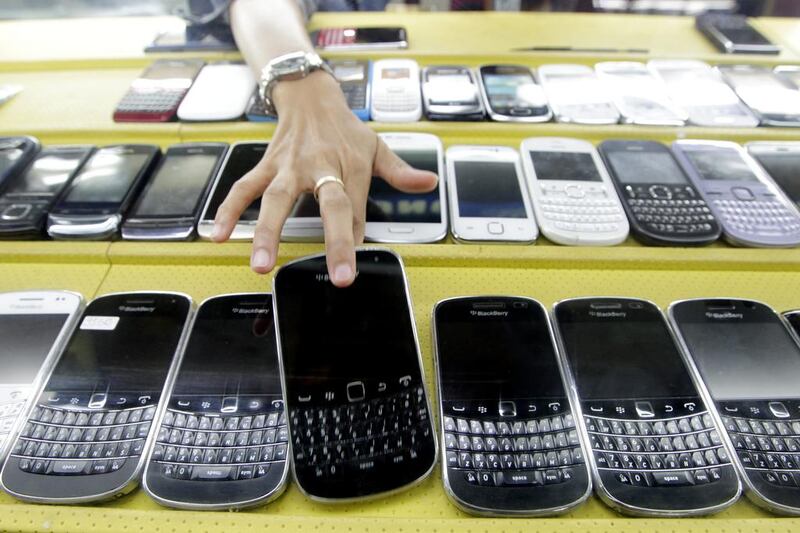Qatar Holding’s reported injection of up to US$200 million into BlackBerry may have provided some relief to investors this week.
But it does not remove key questions over future growth prospects and how to reverse BlackBerry’s losing battle against rivals Apple and Samsung.
Qatar Holding, the investment arm of Qatar Investment Authority, made the pledge as part of a $1 billion convertible bond offering announced this week by BlackBerry. Fairfax Financial Holdings, the company’s biggest shareholder, has agreed to acquire $250m of the bond offering.
“If your handset division is burning through that amount of money you really want to restructure, so that you either shut it down completely or cut it down to an absolute minimum,” said a London-based financial analyst.
The bond was announced after a tentative offer made by Fairfax in September to take the company private in a deal worth $4.9bn failed to materialise.
But Qatar Holding’s involvement in the financing package will do little for BlackBerry’s fortunes unless the company takes drastic action, analysts believe.
The Canadian company announced a revenue drop of 49 per cent for the second quarter of the year together with a loss of $965m, as customers largely shunned its much hyped new handset offerings in favour of those from Samsung and Apple.
Crucially the company’s new interim chief executive, John Chen, has ruled out a sale of the company’s ailing handset business, which spent $500m during the second quarter.
“If your handset division is burning through that amount of money you really want to restructure so that you either shut it down completely or cut it down to an absolute minimum,” said the analyst in London.
One of the few options remaining for the company is to open its email service – which still has about 70 million paying subscribers – to other device manufacturers, thereby retaining cash flows even as subscribers opt for other devices, he said.
As a potential precursor to such a move, BlackBerry last month rolled out its popular BlackBerry Messenger (BBM) for Android and iOS, registering 20 million downloads in its first week.
Mr Chen will replace BlackBerry’s current CEO when the bond transaction closes towards the middle of the month. He has won plaudits for rescuing the struggling data software provider Sybase, eventually negotiating a sale of the company to SAP for $5.8 billion.
Mr Chen’s appointment suggests that Fairfax sees the company’s future in software rather than devices, said Jan Dawson, the chief telecoms analyst with Ovum.
This made sense in light of faltering device sales, he said, but it was still unclear where future growth in this area would come from.
Qatar Holding’s involvement in the bond sale is a departure from the vehicle’s strategy of building up stakes in international blue-chip investments.
In recent months Qatar Holding is reported to have accumulated stakes in companies such as Bank of America, Samsung and Shell, and has bought into convertible bonds from Credit Suisse and Volkswagen.
Buying into the BlackBerry bond was almost the opposite strategy, said the analyst.
“This is a make or break proposition for BlackBerry. If it works, it can be converted at a high premium and everyone’s happy, but if it doesn’t the whole thing goes bankrupt. It’s a bit of gamble on Qatar Holding’s part,” he said.
The bond offering from BlackBerry will pay a coupon rate of 6 per cent over a seven-year period. Upon maturity the bond will convert into shares of BlackBerry worth US$10 each, a 28.7 per cent premium to the closing price of the company’s common shares on November . When converted, the common shares will represent about 16 per cent of the company’s share capital.
The Middle East and Africa is one of the few bright spots for BlackBerry’s handset business. BlackBerry accounted for 14.9 per cent of smartphone sales in the Middle East and Africa during the second quarter, second only to Android. The picture is brighter still in the UAE, where BlackBerry accounted for 27.8 per cent of the market during the quarter, again second only to Android.
However sustaining this position in the region will prove difficult for the company, according to Bhanu Chaddha, a senior research analyst with IDC in Dubai.
“BlackBerry’s new handsets, while being well designed with some innovative features, have failed to strike the right chord with both consumers as well as enterprise users,” he said. “Lack of extensive application ecosystem and growing acceptance of bring-your-own-device culture is acting as a double whammy for the company’s prospects in the region.”
A spokesmen for Qatar Holding and a spokeswoman for BlackBerry Middle East declined to comment.
jeverington@thenational.ae





